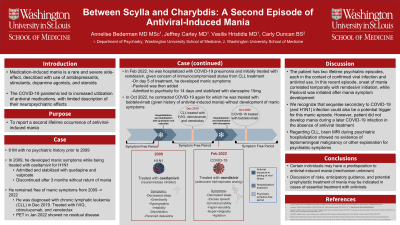COVID-19
Session: Poster Session
(060) Between Scylla and Charybdis: A Second Episode of Antiviral Induced Mania

Trainee Involvement: Yes

Annelise Bederman, MD (she/her/hers)
Resident Physician
Washington University in St. Louis
St. Louis, Missouri, United States
Vasilis C. Hristidis, MD
Resident Physician
Washington University in St. Louis
St. Louis, Missouri, United States
Jeffrey Carley, MD
Resident Physician
Washington University in St. Louis
St Louis, Missouri, United States
Carly Duncan, BS
Medical Student
Washington University School of Medicine
St. Louis, Missouri, United States
Presenting Author(s)
Co-Author(s)
In the interim, patient was diagnosed with chronic lymphocytic leukemia (CLL) in December 2019. He received IVIG, obinutuzumab and venetoclax. End-of-treatment PET scan in January 2022 showed complete metabolic response. In February 2022, he was hospitalized for 6 days with COVID-19 pneumonia. He received remdesivir on day 4-6, with onset of altered behavior on day 5. He started treatment with Paxlovid after discharge. During the next two weeks, he demonstrated decreased sleep, excess speech, emotional lability, hypersexuality, hyper-religiosity, and agitation. This resulted in a 14-day psychiatric hospitalization. He was discharged on olanzapine 15 mg, with mild residual elevated mood and speech. He had no further psychiatric hospitalizations. Notably, he again contracted COVID in October 2022. Given history, antiviral medications were not administered, but he received bebtelovimab. At the time, he was taking only low-dose Seroquel (100-150 mg). Despite this, he did not develop manic symptoms. We recognize that sequalae secondary to COVID-19 (and H1N1) infection could also be a potential trigger for this manic episode. However, patient did not develop mania during a later COVID-19 infection in the absence of antiviral treatment. Regarding his history of CLL, brain MRI during psychiatric hospitalization showed no evidence of leptomeningeal malignancy or other explanation for psychiatric symptoms. 1. Ho LNL, Chung JPY, Choy KLW. Oseltamivir-Induced Mania in a Patient With H1N1. American Journal of Psychiatry. 2010;167(3):350-350. doi:https://doi.org/10.1176/appi.ajp.2009.09101421 2. Ferahkaya E. Oseltamivir-Induced Mania in a Patient With Influenza A. Clinical Neuropharmacology. 2021;44(3):106-107. doi:https://doi.org/10.1097/wnf.0000000000000446 3. Nebhinani N, Panda T, Suthar N, Choudhary S, Singhai K. Relapse in bipolar disorder in hospitalized patients with COVID-19: A case series and key recommendations. Indian Journal of Psychiatry. 2021;63(6):610. doi:https://doi.org/10.4103/indianjpsychiatry.indianjpsychiatry_1433_20 4. Haddad PM, Alabdulla M, Latoo J, Iqbal Y. Delirious mania in a patient with COVID-19 pneumonia. BMJ Case Reports. 2021;14(11):e243816. doi:https://doi.org/10.1136/bcr-2021-243816
Background: Medication-induced mania is a rare and severe side effect, often described only with antidepressants, stimulants, dopamine agonists, and steroids. The COVID-19 pandemic led to increased utilization of antiviral medications, with limited description of their neuropsychiatric effects. We report a second lifetime occurrence of antiviral-induced mania.
Case: A 61-year-old man presented to the ED for behavioral changes in March 2022. His psychiatric history began in 2009 after H1N1 infection treated with oseltamivir1,2. He developed manic symptoms, including decreased sleep, grandiosity, hypergraphia, irritability, disinhibition, and paranoid delusions. He was admitted and stabilized on quetiapine and valproate, which were discontinued after 3 months with no further psychiatric contact.
Discussion: The patient has two lifetime psychiatric episodes, each in the context of confirmed viral infection and antiviral use. In this case, onset of mania correlated temporally with remdesivir initiation. Although patient later received Paxlovid, his maniform symptoms predated its administration. There are limited descriptions of individuals experiencing mania after administration of remdesivir3,4.
Conclusions: Certain individuals may have a predisposition to antiviral-induced mania. Discussion of risks, anticipatory guidance, and potential prophylactic treatment of mania may be indicated in cases of essential treatment with antivirals.
References:

